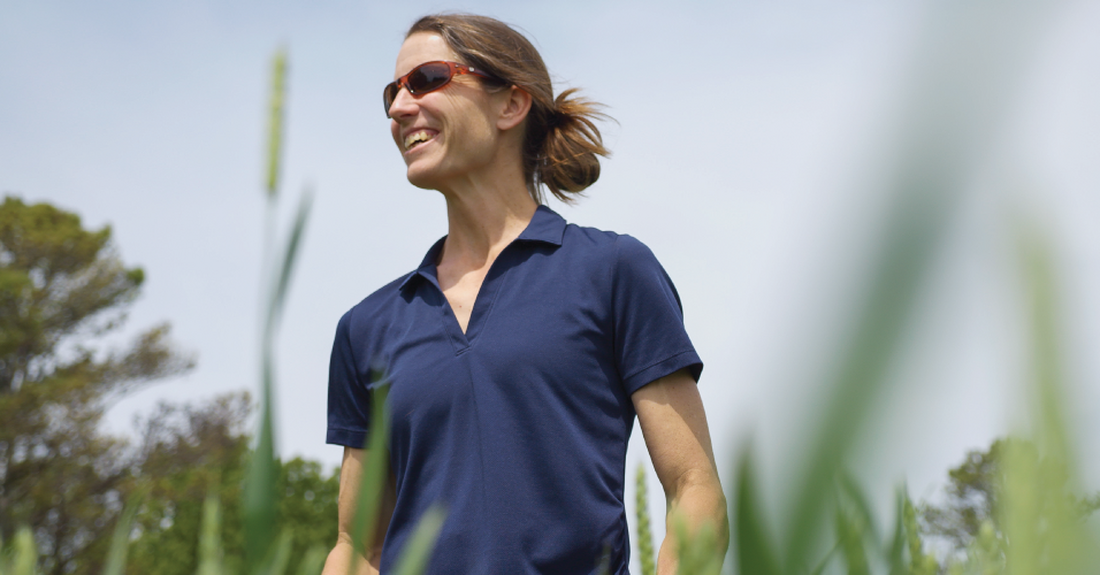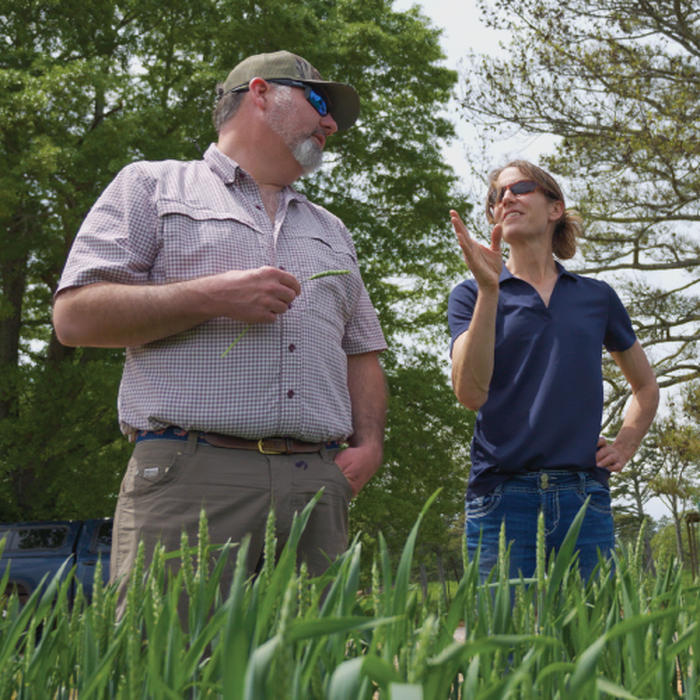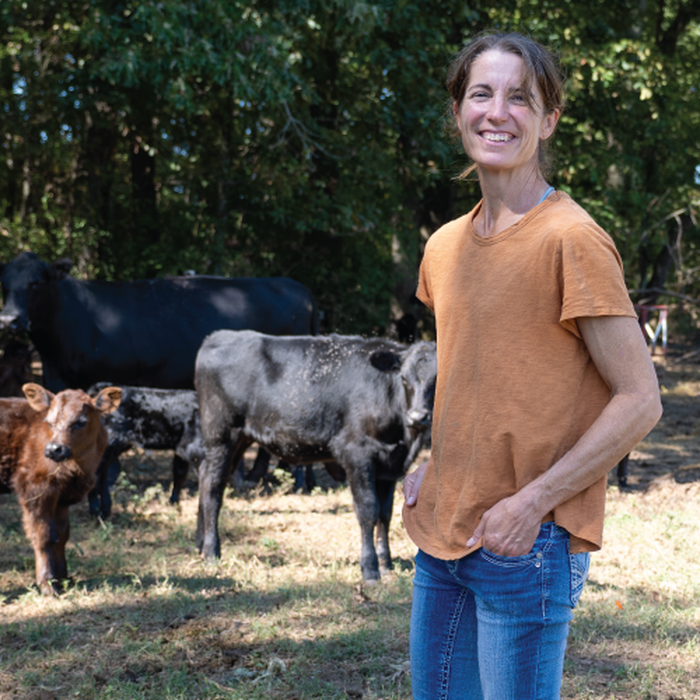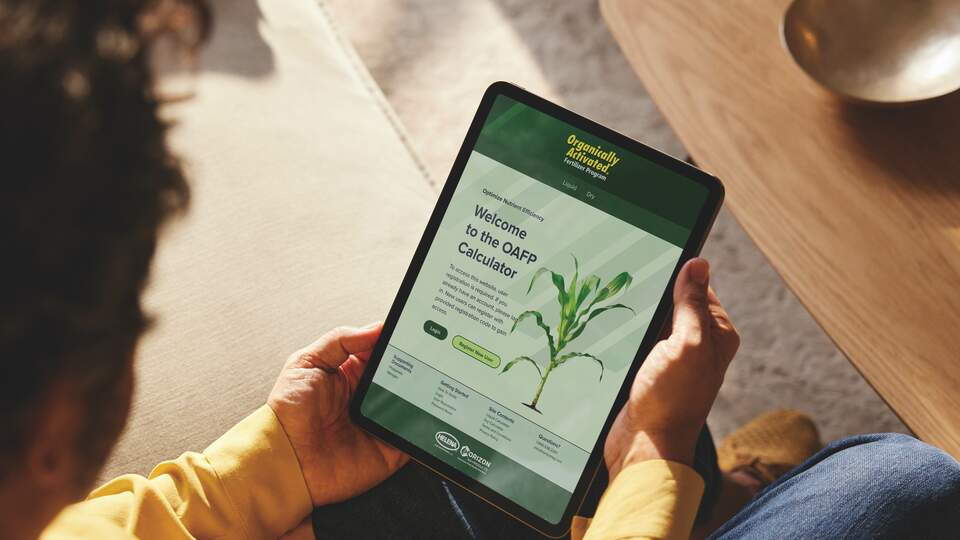Nestled among the lush native woodlands and red rolling hills of northern Alabama, Jamie Blythe is carrying on her family’s legacy of holistic farming. A third-generation farmer based in Courtland, Alabama, Jamie manages land originally cultivated by her grandfather in the 1890s. The farm now encompasses a total of three thousand acres, with a crop rotation of corn, soybeans and wheat, as well as a cattle operation.

Jamie took over managing her family’s farm operation in 2011, placing a strong emphasis on rebuilding her soil’s organic matter, which had been decimated by a century of cotton farming. As part of her fertility management strategy, Jamie has been experimenting with Resurge applications for the past three years in increasing rates, along with utilizing no-till practices and cover crops. Jamie saw a “visual difference right away” with “early-season green growth” and also notes the increase on her yield maps for her Resurge-applied fields.
As a single mother of two children — one with special needs — Jamie is familiar with the pressures of balancing the complex workings of a successful farming operation while maintaining a healthy home life. Jamie emphasizes the importance of “having that holistic approach to the entire farming operation, be it family or work. That’s the biggest challenge, maintaining that balancing and staying healthy.” She continues, “Farmers, I think, really struggle with the mental and physical health sometimes.” Jamie cites the many challenges that farmers face in today’s agricultural industry, such as encroaching urban development, skyrocketing land prices, shifting global markets, and high interest and seed rates, which must all somehow still be balanced in the final budget for a net profit per acre.

Jamie’s experiences with the numerous challenges of farming both at home and in the field have contributed to her belief in the importance of building organic matter. “That is our primary focus of all of our management decisions,” Jamie explains. “That’s the only way this farm’s going to be profitable. ... If we don’t have our organic matter slowly, steadily increasing, we’re not going to be able to keep the farm going.” According to Jamie, “Resurge is just going to amplify those decisions that we’re making.” She says the product’s success in her fields gives her confidence. “It makes you feel like, OK, I am on the right track. I can see something; I can pinpoint that there is a difference. ... You're on the right track; it’s worth that money per acre.”
As a generational farmer, Jamie has also experienced significant changes in the industry and in the land itself. She describes, “seeing the crop rotation mixes change, having a greater focus on the soil microenvironments. That has been a tremendously different strategy that wasn't around when I was a child. So that's been a wonderful thing to see, you know, treating each acre as its own entity. I think we have a lot more intimate relationship with our land as farmers now. We have the ability to analyze down to the smallest nutrient, the smallest acreage. So that's been a great change in our mindset and the way that we farm. And I do see the land being so much more productive, the wildlife population that is so healthy out here, that was not here when I was a child. We have turkey and deer and bald eagles and all the predator-prey interactions that are part of a healthy ecosystem, and that didn't exist when I was a child on this land. And now it's here. And I think it's because our land is healthier. It supports all populations down to the microenvironment. You dig up the soil and it's alive.”

In addition to the changing land, Jamie has witnessed the differences between her experience as a farmer and that of her father and grandfather. She explains, “I don't think you could get much more different nowadays. There're so many more opportunities you have coming from the perspective of a woman farmer, of a single mom. As a farmer, you know, that would not have been possible 50 years ago, 100 years ago. And it is now. I think that we have so many resources now; it’s such a safety net of help and assistance — agronomy assistance or financial advice. That has been an amazing change that I've seen in the farming industry and this community. There could not be a better community, I think, to have that work-life balance. It makes it easy for me to do what I do and to keep this farm a healthy place and thriving and to keep my family thriving. So I think looking to all of the help that we are surrounded by in this community has been one of the biggest blessings of farming here. And it's made it easy for me.”
Jamie’s journey as a farmer is a testament to the resilience and adaptability required in modern agriculture. Her commitment to holistic farming practices and soil health not only honors her family's legacy but also sets a strong foundation for future generations. Jamie’s story is an example of how innovation, community support and a deep connection to the land can create a thriving and sustainable farming operation. Click here to view Jamie's full interview.


